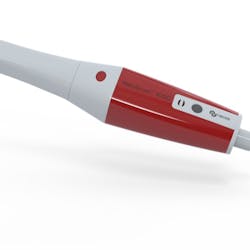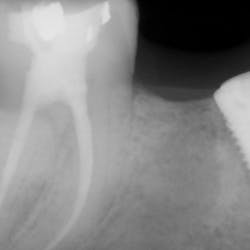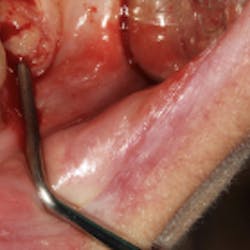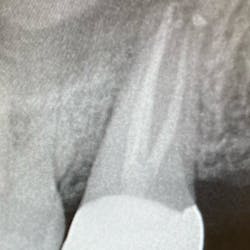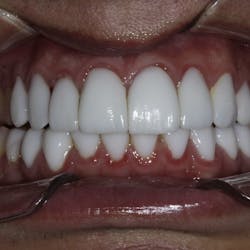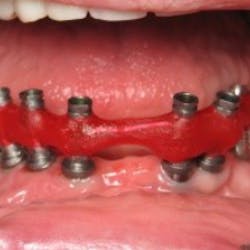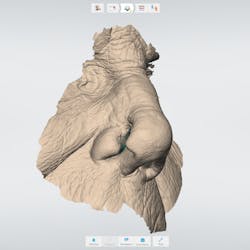Copyright Dreamstime.com
ALSO BY DR. BRANDON KATZ |Guided tissue regeneration: background to current indications and applications
One article, by Ofilada, stated that, “Diabetics have been said to suffer greater bone resorption than nondiabetics.” This will lead to the need for greater relining of dentures than nondiabetics. He also stated that the presence of oral pathologies that would normally need surgical correction go unnoticed and that if surgery is performed and new dentures are fabricated, complications such as infection or inability to eat during the postoperative and adjustment period can lead to poor nourishment.
ALSO BY DR. BRANDON KATZ | Ferrule: Why is it important, and how much do we need?
Thomas Cleary et al. completed a cross-sectional survey of 370 outpatients at the Department of Veteran Affairs facility. His purpose was to assess the association of extensive tooth loss, obesity, and noninsulin-dependent diabetes mellitus (NIDDM). The results of the study found that “functionally edentulous patients were at a significantly greater risk for NIDDM than obese.” He quoted an article by Joshipura, which states that trends have shown that completely edentulous people without rehabilitation tend to avoid protein, fiber, fresh fruits, and vegetables in favor of softer foods rich in carbohydrates and saturated fats. Cleary also stated that it was beyond the scope of the study to assess the effect of dental restorative status or the duration of NIDDM.
Joshipura also stated in her article that a difference was found between dentate (25 or more teeth) and edentulous patients regarding intake crude fiber, carotene, vegetables, fresh apples or pears, and carrots, and that edentulous patients consumed more saturated fats and cholesterol. Differences were not noticed in fruit intake and vitamin C; this was assumed to be because the patients were able to get those nutrients in liquid or juice form.
R.E. Nowajack-Raymer also completed a study, utilizing NHANES III, on the comparison of the intake of nutritious foods, dietary fiber, and levels of biochemical analytes between edentulous complete denture wearers and those who had their natural teeth. The findings suggested that the denture wearers did have a nutritional disadvantage when compared to the dentate patient. These disadvantages included dietary fiber and nutrients known to have anti-cariogenic effects. Serum beta-carotene, serum folate, and serum vitamin C were biochemical analytes also shown to be in lower levels.
Other studies, Moore P. et al., have investigated the effects of insulin-dependent diabetes and its correlation with tooth loss and have surmised that the duration of Type 1 diabetes is associated with greater tooth loss. Literature is also quite prevalent on the issue of periodontal treatment and its help in diabetic status, especially regarding glycemic control. Kiran M. had significant results with regard to PI, GI, PPD, CAL, BOP, and most noteworthy regarding HbA1c in Type 2 DM patients. All measures were reduced in the group that received nonsurgical periodontal treatment when compared to the control group that did not receive any treatment.
One last topic of interest was studied by Krishan Kapur et al. in a five-part study published in the Journal of Prosthetic Dentistry. This randomized clinical trial was undertaken to compare the efficacy of conventional mandibular and implant-supported overdentures in diabetic edentulous patients. The differences between treatment modalities were not shown to be significant. Complications were associated with both types of treatment, such as frequent denture base adjustments for the CD group and frequent clip replacements and repairs with IOD group. Regarding masticatory performance, patient satisfaction, nutritional intake, and food choices, there were no differences between the CD and IOD groups except in chewing ability with having less difficulty in chewing hard foods. A higher percentage of patients with IODs did report a perceived improvement in chewing ability, chewing comfort, and denture security; however, the data did not show any significant differences except in chewing ability.
Many topics have been investigated regarding the oral health care and restoration of the oral cavity in diabetic patients. One topic that seems to have a lack of scientific evidence in current health-care literature is the question of whether or not restoring edentulous diabetic patients with the use of removable complete dentures either aids or hinders the patients’ ability to control their glycemic levels and diabetic status. Further investigations into this topic are warranted before any conclusions can be made.
References
• Ofilada E, et al. The oral health of diabetics. J Philipp Dent Assoc. Jun.-Aug. 1995;47(1):27-31.
• Cleary T, et al. An assessment of the association between functional edentulism, obesity, and NIDDM. Diabetes Care. July 1995;Vol 18.
• Joshipura KJ, et al. Effect of edentulousness on diet and nutrition. J Dent Res 1994;73: 207.
• Moore P, et al. Type 1 diabetes mellitus and oral health: assessment of tooth loss and edentulism. J Public Health Dent. 1998;58(2):135-142.
• Kiran M, et al. The effect of improved periodontal health on metabolic control in Type 2 diabetes mellitus. J Clin Periodontol. 2005;32:266-272.
• Kapur K, et al. A randomized clinical trial comparing the efficacy of mandibular implant-supported overdentures and conventional dentures in diabetic patients. Part I-V. JPD 1998.



